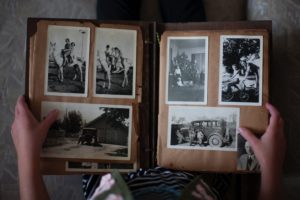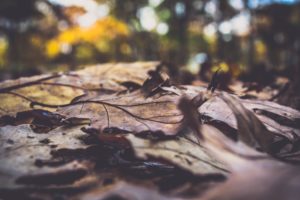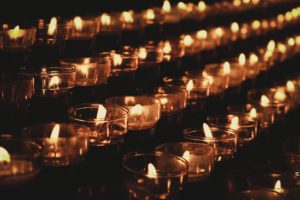by Jenny Rose | Jan 10, 2019 | A Flourishing Woman, The Journey

Photo by Laura Fuhrman on Unsplash
I’ve lately been revisiting David Whyte’s work, including one of his audiobooks titled What to Remember When Waking. He suggests having faith in things falling away.
It caught my attention because usually we speak of faith in what we judge to be positive: Courage, kindness and the sun coming out tomorrow. Having faith in the shadow side of life suggests a deeper wisdom.
This coincides with my current personal focus on shame, which I discover (to my chagrin and sorrow) is a burden I carry every day and can’t remember being without. I knew it was there, in the roots of me, but generally speaking I try to hide it and look the other way. I’ve never had any idea how to eliminate it or transform it into something less painful and more effective, so it’s become firmly and almost invisibly established.
Whyte, a magnificent poet, prompted me to think differently about feelings and experiences we typically cast as negatives and try to avoid, ignore, hide or minimize. Have faith in things falling away.
What kind of things fall away?
Leaves in autumn, innocence, comets, people, memories, time, feelings, others beloved by us, and our own lives. Flowers drop their petals. Snakes shed their skins. Seconds and years fall away, one by one. The sea ebbs from the land and then returns. What we can see of the moon wanes and falls away to nothing before it waxes once more. A fertile woman watches each month’s possibility of new life fall away when she is not pregnant. The dark falls away before the light, and the light before the dark. Cell by cell, lash by lash, hair by hair, our bodies fall away during our lifetimes.
Sometimes we fall away from others, or tear ourselves away from jobs, relationships or places.
Some things we are glad to let go and leave behind us. Other losses are so terrible we feel permanently maimed.
Then there are things like shame that are forced upon us by others, that cripple our joy and our ability to love ourselves. We long to be free of such burdens, to let them fall away, but we don’t know how to do it. Even if we find a way to loosen their grip upon us, we are sometimes unwilling to cast them completely aside, because then we would become strangers to ourselves, strangers in our own lives, and we fear that change more than our familiar suffering.

Photo by fancycrave on Unsplash
Faith in things falling away. Trust and confidence, in other words, in both loss (things we don’t want to lose) and relief (things we do want to shed).
Could it be that the way through shame, longing, fear, anguish and the like is to turn toward it, embrace it, kiss it on the mouth? Is that what must happen before it can fall away? I wonder.
Can we trust in the approaching storm as much as we trust in the sun coming out tomorrow? Can we trust in the unraveling, the fraying, the slow decline, the darkest shadows of our hearts and actions, as well as healing, vigorous new life, and our kindness and compassion?
I suppose what I’m really asking is if we can trust in all of our experience and feeling, whether comfortable or agonizing, in any given moment. Can we trust in change and suspend our judgement about whether it’s good or bad? If our world is burning around us and everything we know or have is falling away to ash, can we have faith in the purification of that terrible loss?
Taking it further, am I willing to have faith in my own frustration, anguish, scars and shame? Am I willing to explore these things, talk with them, allow them to teach me, even love them, and then let them go or transform? Do I possess the courage to let an outdated version of myself fall away while I enlarge my soul?
Inevitably, inexorably, things change and fall away. As human beings, how do we choose to live with that fact? Faith or resistance?
Tonight I will sleep with my worries through dreams dark with soil
and the heaving cataclysm of the spade
turning earth round me
not speaking of air
or light fused with greenness
but of darkness
and the first leaves
like hands in prayer
clasped inside the seed.
— David Whyte, “Inside”

Photo by Trevor Cole on Unsplash
All content on this site ©2019
Jennifer Rose
except where otherwise noted
by Jenny Rose | Jul 19, 2018 | A Flourishing Woman, The Journey
In the used bookstore in which I volunteer, I found a slim paperback book of poetry, modestly and plainly bound, entitled A Gypsy’s History of the World, by Kim Robert Stafford. It called to me and I bought it for $4.00.

Photo by Syd Wachs on Unsplash
I had never heard of this poet, but he turns out to be quite well-known and has published several books, which I’ll be looking for now. In the meantime, this book is filled with treasures.
For a couple of days I’ve been groping for this week’s post. Sometimes they come so easily, these posts. Other times I flounder. It seems that the more I have going on, the harder it is to come up with a focused essay. Irritating, but writing can be like that.
When I listen to the sound of my life this week I hear a cacophony. There are the half-excited, half-apprehensive feelings I have as the night approaches on which I’ve scheduled a local venue to once again try to start a dance group. (Will I be a good leader? Will they like me? Will anyone come?) There’s the increasing pressure I feel to find a way to earn a paycheck. There are new friends and our conversations as we strengthen our connections. (Am I talking too much? Am I offensive? Am I too blunt? Do I ask too many questions?) I’m preoccupied with family dynamics and past, present, and future possibilities and fears. (What’s the right thing to do? What’s loving? What’s useful? What will people think about me? How do I take care of everyone’s needs and expectations? How much irreparable damage will I do if I make the wrong choice?) There are my weekly activities and appointments. All the material of my daily reading swirls in my head, awaiting synthesis and integration.
In my creative world, I’m with Pele, the Earth-Shaper, sensual, passionate and angry. This week others will come to dance with her, to make offerings, to propitiate and reconnect. Revolving around her are other characters: Rumpelstiltskin the dwarf; Poseidon, the Greek god of the sea; a little brown bat called Ash and his companion, a bark beetle; the eldest of the twelve dancing princesses, Ginger; an old woman, Heks, apprentice to Baba Yaga; and Persephone, who comes to drum for the dance.
All this, and I can’t come up with a thing to post about.
I know this dynamic. The more pressure I put on myself, the harder I try, the more elusive inspiration will be.

Photo by Pascal Müller on Unsplash
It’s a foggy morning here in Maine. Foggy and oppressive with high humidity and a threat of severe weather this afternoon. I’m planning on meeting a new friend for a walk and then I’ll swim. I decided to stop trying to write a post. I turned off all the lights up here in my little attic space and lit a candle. I picked up A Gypsy’s History of the World and turned back to the beginning of the book.
Duets
A dream flips me into the daylight.
I pry my way back:
a door opens, I enter, never
escape; the jailor sings by morning
duets through the bars with me.
I wake and out my window
by dawn a blackbird sings and
listens, sings and listens.
Listen. Thistledown jumps its dance
in the wind. I’m small and have
no regrets. Yesterday is a temporary
tombstone, a hollow stalk
on the hill. I’m putting my best
ear forward; in the space between songs
I’m travelling. My hands make
whistling wings in the wind.
No things meet without music:
wind and the chimney’s whine, hail’s click
with the pane, breath in a bird’s
throat, rain in my ear when I
sleep in the grass. I miss the
whisper of a swallow’s wings
meeting the thin air somewhere far.
Branches of my voice, come back.
Inside each song
I’m listening.
At once the cacophony in my head faded away, no more than the murmur of the trees and breeze or the ocean’s breath. For a few minutes, I thought about being small and having no regrets, let alone imagining future regrets. Yesterday and yesterday and yesterday, all temporary tombstones. All my yesterdays add up to almost 20,000 hollow stalks on a hill. And yes, activities and schedules, efforts and appointments, hopes and fears, words and information, friends and family, the way the shadowed ceiling looks in a sleepless hour and the path of silent tears on their way to my pillow. All of that. But I forget about the space between all those songs. I forget that I’m traveling through this place, this life, and these landmarks.

Photo by Dakota Roos on Unsplash
Sometimes I forget to just listen to life’s music, just witness, just be present and still. Sometimes I forget to fold my hands in my lap and watch the wavering shadows the candle makes inside the song of my life. The song will not be endless. One day it will be yesterday’s song, held in a hollow stalk on a hill. I can’t reach out my hand and clutch it, pin it down, record it and make sense of it. I don’t need to. I don’t want to.
Today, friends, I’m listening.
My daily crime.
All content on this site ©2018
Jennifer Rose
except where otherwise noted






